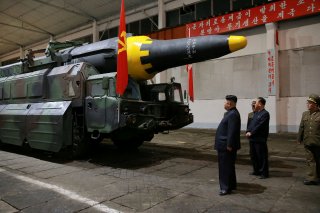Nearly 90% of South Koreans Think North Korea Will Never Give up Its Nuclear Weapons
And that can only mean one thing: dialogue and negotiation are needed, now more than ever.
Marking the anniversary of the 1950-1953 Korean War is always a heavy emotional affair. You can see the strain and grief in the eyes of the men (the youngest now in their late-80’s) who fought on the frontlines and continue to carry the memories of that horrible three-year ordeal with them. Nobody is anticipating an official conclusion of the war anytime soon, which means the vast majority of these veterans will die without seeing a peace treaty signed between Washington, Seoul, and Pyongyang. The fact that a full seventy years have passed with the armistice still in place only compounds the sadness and leads many who experienced the conflict to wonder whether peace will ever be possible.
It’s this context why the Korea Institute for National Unification (KINU)’s latest unification survey is so timely and important. Seven decades after the first shots were fired on the Korean Peninsula and over eight months since U.S. and North Korean officials last met for face-to-face nuclear talks, how are South Koreans feeling about the prospects for peace with their northern neighbor? Are they discouraged? Sad? Angry? Hopeless? Or do they hold at least some sliver of hope that the situation could turn around?
According to KINU’s poll, there is no question South Koreans are a bit apathetic about the North. Trust in North Korean leader Kim Jong-un’s regime has declined from 23.8% in November 2019 to 15.6% today, a result of a two-year inter-Korean reconciliation process that hasn’t resulted in the divine peace and harmony South Korean President Moon Jae-in promised in 2018. Nearly 90% of South Koreans believe North Korea will never give up its nuclear weapons regardless of what the U.S. and Seoul offer in return. 41.7% are skeptical there is anything the South Korean government can do about the North’s nuclear development—a seven-point rise from the previous year. The South Korean population, at least if KINU’s survey is any indication, largely looks at North Korea and sees an uncooperative, stubborn, if not irreconcilable entity that will remain a nuclear power for years to come.
You can’t fault the South Korean people for this perception, particularly given the events of the last two weeks, with North-South communication links cut, the liaison office blown up in a spectacular show of defiance, and Moon himself showing the limits of his patience with Pyongyang’s antics .
KINU, however, also finds that South Koreans are quite pragmatic with respect to North Korea policy. While Kim’s trust numbers may be in the toilet, the percentage of South Koreans who said that dialogue and compromise with the North should be pursued increased from 38.1% last November to 45.7% today.
These numbers are confused on the surface, but there is actually some logic to it.
First, Moon Jae-in’s engagement policy with Pyongyang appears to be one of his biggest positives. As the poll suggests, the South Korean people remain supportive of what Moon is trying to do: establish a degree of tranquility with the Kim regime in order to minimize the possibility of a miscalculation, demonstrate to the North that there are more goodies in cooperation than confrontation, and strive toward the day when the two Koreas can finally exchange ambassadors, operate embassies on one another’s territory and celebrate normal diplomatic relations. Sure, the Blue House may not have much to show for its efforts (partly because Washington continues to put Seoul on a leash and restrict what it can do on the reconciliation track), but it’s not like Moon’s conservative political opposition has a better idea about how to address the problem.
Second, never underestimate the power of history. The Korean War is a graphic reminder to tens of millions of Koreans on the peninsula of how bloody and destructive inter-Korean relations can get if dialogue is sacrificed. While younger South Koreans don’t exactly have North Korea top of mind in their daily lives, the three-year war between the North and South is baked into the national narrative on both sides of the DMZ. South Koreans have been living for decades under the cloud of North Korean artillery stationed a few dozen miles outside of their capital city. Any renewed armed conflict between Seoul and Pyongyang would certainly involve Washington and likely drag Beijing into the mix as well. While North Korea wouldn’t be able to compete with U.S. and South Korean military hardware, the Kim regime could unleash a torrent of fire on South Korean soil that would kill hundreds of thousands of people—millions if nuclear weapons become part of the equation.
Maintaining a dialogue, or at least channels of communication, is a low-cost and common-sense mechanism to ensure the worst doesn’t happen.
Unless something unexpected happens, the inter-Korean track and U.S.-North Korea negotiations will be frozen in place this year. President Donald Trump will be focused on his re-election campaign over the next five months and believes the political costs of another summit with Kim Jong-un outnumber the benefits. As Frank Aum of the U.S. Institute of Peace pointed out in May, “It’s hard to envision anything that could cause any dramatic shifts from either side, at least this year.” No truer words have been written.
South Koreans, however, don’t see many viable alternatives to keeping the phone lines open.
Daniel R. DePetris is a columnist at the Washington Examiner and a contributor to the National Interest.
Image: Reuters

